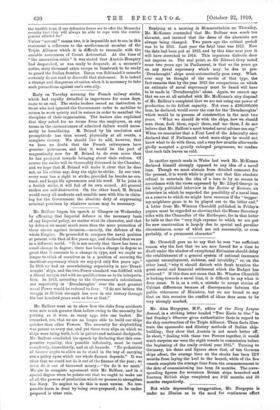Replying at a meeting in Monmouthshire on Thursday, Mr. McKenna
contended that Mr. Balfour was much too alarmist, and insisted that the dates of the alarmists are always. being changed. Two years ago the critical period • was to be 1911. Last year the fatal time was 1912. Now the date had been put at 1913, and by this time next year it will have stretched to 1914. This ingenious dialectic does not impress us. The real point, as Sir Edward Grey noted some two years ago in Parliament, is that as the years go on any naval supremacy which may be due to pre- ' Dreadnought' ships must automatically pass away. What- ever may be thought of the merits of that type, the fact remains that by the year 1913 the comparisons on which an estimate of naval supremacy must be based will have to be made in Dreadnoughts' alone. Again, we cannot say that we are at all satisfied with Mr. McKenna's airy disposal of Mr. Balfour's complaint that we are not using our power of production to its fullest capacity. Not even a £100,000,000 loan, he declared, would cover the cost for the 'Dreadnoughts' which would be in process of construction in the next two years. " What we should do with the ships, how we should man them, dock them, repair them, and use them, I do not believe that Mr. Balfour's most trusted naval adviser can say." When we remember that a First Lord of the Admiralty once declared that if Parliament voted more ships he would not know what to do with them, and a very few months afterwards gladly accepted a greatly enlarged programme, we confess that such talk leaves us cold.














































 Previous page
Previous page